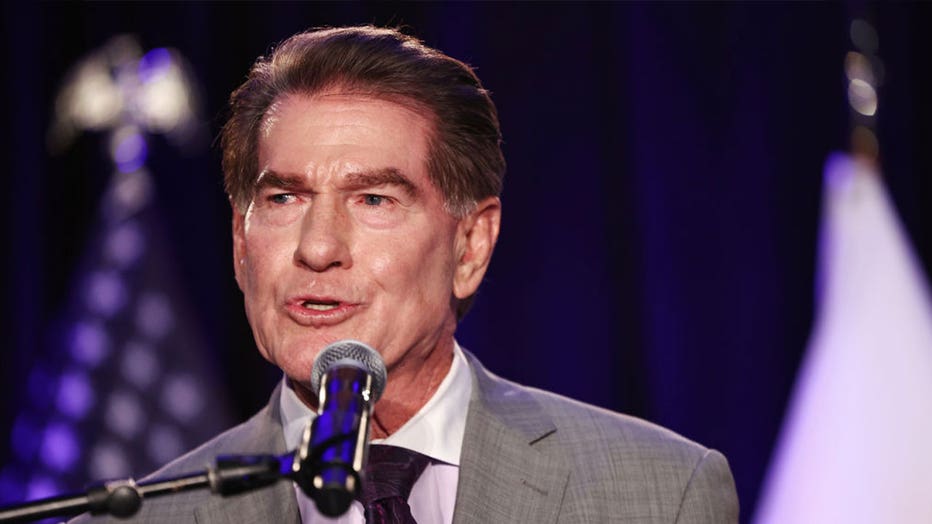Steve Garvey: Where the California U.S. Senate candidate stands on these issues

Steve Garvey on why he's running for US Senate
California Senate candidate Steve Garvey talked to FOX 11 on what made him run for the seat, what his goals are, and where he stands on some of the top issues in the Golden State.
Steve Garvey, a former Major League Baseball star, is running as a Republican candidate for the U.S. Senate in California against Democratic Congressman Adam Schiff.
Best known for his time with the Los Angeles Dodgers and San Diego Padres, Garvey's baseball career in the 1970s and 80s earned him widespread recognition, which is now playing a central role in his political campaign. Despite having no prior experience in public office, Garvey is leveraging his celebrity status to appeal to voters.
With only 24% of California voters registered as Republicans, Garvey is in a tough race against Schiff in California's heavily Democratic state.
Garvey's stance on crime
On the issue of crime, Garvey is a strong supporter of Prop. 36, a 2024 ballot measure that would reverse Prop. 47 which California voted into law 10 years ago. He said Prop. 47 led to a surge in crime by reducing penalties for serious offenses. His plans also include increasing federal resources to communities facing crime waves, and increasing funding to hire more law enforcement officers.
RELATED: California Prop 36 explained: Increasing penalties for theft and drug trafficking
"Our sheriffs and police need reinforcements, they need investments in them, technology. I believe in our police and our law enforcement and first responders. It's the [district attorneys] that need to step up and they need to prosecute to the full extent of the law. And you can't have the idea of stealing $950 from a store and nothing's going to happen to you," Garvey told FOX 11.

Republican Senate candidate Steve Garvey, a former Los Angeles Dodgers baseball player, speaks to supporters at his election night watch party on March 5, 2024 in Palm Desert, California. (Photo by Mario Tama/Getty Images)
Garvey's stance on homelessness
On the issue of homelessness, Garvey said one of the first things he would do in Washington is call for a federal audit of the $20 billion that was spent on homelessness in California and track where exactly the money is going. His proposed policies also include ending "Housing First" requirements as they are not a one-size-fits-all approach.
"The big problem in America is oversight on key issues, compassionate issues. And that's why I say when I went to San Diego, the Alpha Project is a great example for the villages. And here in Los Angeles, it's the Dream Center. And the center is a model for America on how you take people off the streets, and you put dignity back in their hearts by working with, number one, their mental illness, number two, addiction, number three, in a secure environment that they can live so they can go back, have a job, and feel like they are contributing to society."
Garvey's stance on the economy
The cost of living has skyrocketed in the past years, making it extremely difficult for many to get by on their earnings.
Garvey's plans to control the cost of living is to control federal spending, codify regulatory budgets into law, stop policymakers from implementing costly regulations, and to hold the Federal Reserve accountable.
"What I would do is go back and work with my constituents to get back to a vibrant capitalism supply side economics, where money starts to flow into the pockets of hardworking Californians. So in the morning when they get up, they're not forced to buy $10 worth of gas but can afford ten gallons worth," Garvey said.
Garvey's stance on immigration
Garvey's policies at the US-Mexico border include increasing border patrol, ensuring asylum seekers remain in Mexico while their claims are processed, and to prevent undocumented immigrants from being released into U.S. communities without proper legal proceedings. In December, Garvey visited the border and told FOX 11 weeks later that his plan was to close the border, but during an interview months later in September, he said his goal now is to secure the border.
"Everybody says close the border. It's not realistic because a number of men and women come across the border to work every day. So we have to respect them. But we've got to start vetting the people coming into this country that are illegal. We just need to reinforce the U.S. Border Patrol and ICE. We need to get more jurisprudence and be able to make decisions on these people, vet them more when they come across the border."


